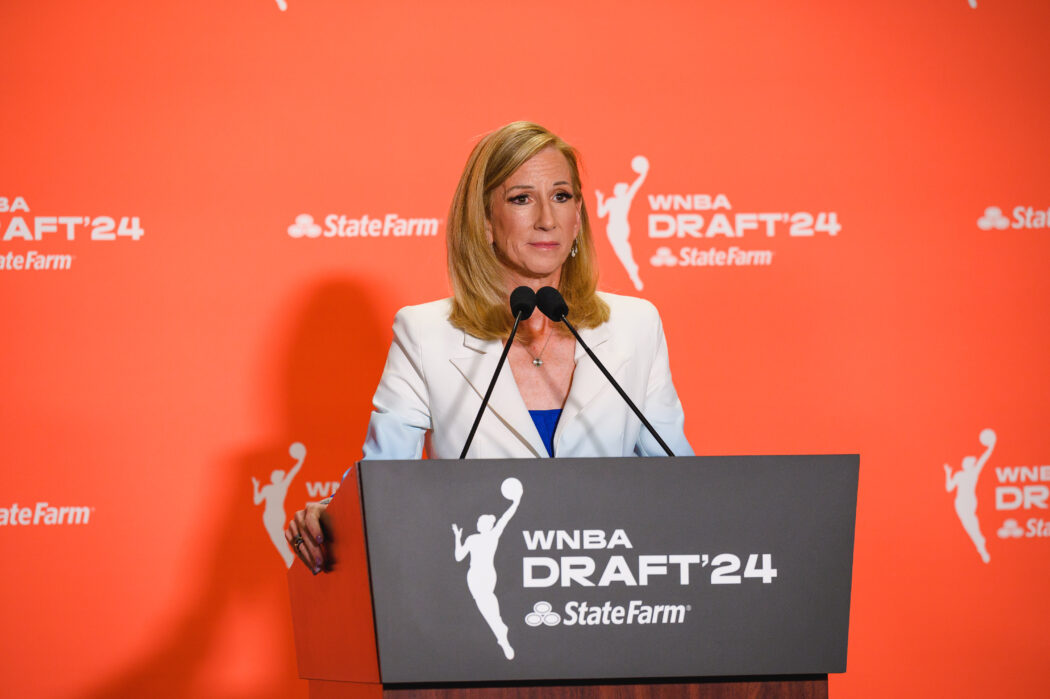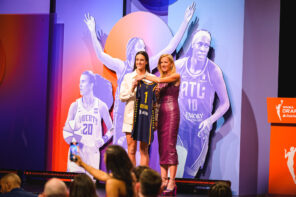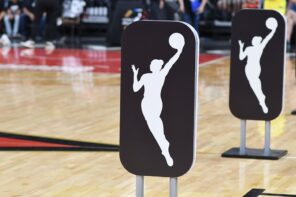Nowadays, we have WNBA Monday moments that happened to occur on a Tuesday. This is the part where WNBA commissioner Cathy Engelbert entered the chat – in, not exactly, the most auspicious of fashions.
Recently, Engelbert was on CNBC and was asked a question about how the Caitlin Clark-Angel Reese discourse has made its way into the W and not always in the most flattering of manners.
The question on CNBC pertained to the increased racism and harassment that Black players such as Reese, Chennedy Carter, Diamond DeShields and the Connecticut Sun’s DiJonai Carrington have experienced – mostly from so-called “fans” of Clark.
Engelbert gave an answer indicative of someone who has been watching a bit too much CNBC.
Longtime sports scribe Maggie Hendricks, whose resume includes covering Olympic sports put it best in a response tweet to Lyndsey D’Arcangelo.
That interview spread like wildfire throughout the WNBA universe and the response from players was not exactly congratulatory.
Apparently, Stewie’s comments following the New York Liberty’s victory over the Dallas Wings were enough for Engelbert to send of a tweet addressing that CNBC interview.
That tweet is the perfect example of damage control in the public relations realm.
Engelbert knows full well that answer was as tone deaf as it gets. Hendricks nailed it when she said the answer came across as if she was speaking to shareholders at Deloitte – or if she were on a virtual Zoom conference with a potential WNBA sponsor.
Let us be fair to Engelbert for a second – she has done plenty of great things for the W since assuming the reins from the previous league president in Lisa Borders. There is more money flowing in the W’s direction than ever before, interest and media coverage are on the rise and the league is finally doing what we all hoped it would – expand to new cities.
Also – spearheading the league through the harsh headwinds of the pandemic and ensuring there was a 2020 season was another accomplishment. Not to mention a new media rights deal for the WNBA where NBC and Peacock will be W broadcasters beginning in 2026 and the valuation of teams and league on the rise.
But on this, it is clear Engelbert lives too much in a business-minded bubble. One would expect that given her previous life as CEO of a major accounting firm. But to be that much in a business bubble where one cannot see the obvious problem of racism from new “fans” is a massive red flag.
Engelbert’s answer set off so many alarm bells that the WNBPA felt compelled to issue its own statement.
The massive error in Engelbert’s statement is not in what she said – it is what she did not say. Denouncing racism and calling out harassment of players should have been somewhere in that CNBC interview. If she wanted to compare the current Clark-Reese moment to Larry Bird and Magic Johnson in the 1980s, then she can certainly do that.
But that interview was certainly a low point in her tenure as commissioner that has probably had more highs than lows. In a league where the vast majority of its players are Black, the last thing one would want to do is to mess up player-league relations by failing to denounce the obvious racism and harassment those Black players have endured in person and on social media.
The WNBA has bent itself over backwards on numerous occasions to capitalize on the Clark Effect. It staged its draft in front of fans earlier this year at the Brooklyn Academy of Music in large part because of her. A multitude of Fever games have been moved to national television because of her. And let us be honest – she is the reason why next year’s All-Star weekend is scheduled to take place in Indianapolis.
But there is a dark side to the Clark Effect as well – and that is what players are experiencing first hand after Fever games. In fact, even Clark’s teammates in Indiana experienced this dark side. Earlier in the season when Indiana was going through its struggles, Aliyah Boston had to get off social media because the vitriol from Clark supporters in Indiana (and Iowa) was too much for her to handle.
And do not even get us started on the Sheryl Swoopes stuff…
That response was in no way a good look for the commissioner. Engelbert looked like someone who is so caught up in the positive business side of the Clark Effect that she is ignoring the real world consequences (and mental health) of Black players on the other side said effect. When all is said and done, commissioner, WNBA players are still humans with real human emotions at the end of the day.
Many fans are calling for Engelbert’s job after that disastrous interview performance because she came across as someone completely willing to gentrify the WNBA even if it means better business.
It was not that long ago that we wrote about what the consequences of such a direction would be – from making the experience of going to a game less authentic and more corporate to potentially negative consequences for Black media covering the W in favor of more legacy (white) outlets simply because they have bigger budgets even though players would not feel as comfortable. Not to mention, the potential for this harassment to only increase.
Only time will tell if that will actually happen but the harassment, racism and death threats being aimed at players is happening now in real time. Plus many of those purveyors claim to be fans of Clark yet they are many of the same people who were calling the WNBA trash prior to this year.
Engelbert needs to get out of her numbers bubble – we know, that is a hard undertaking for someone who background is in accounting to do. Because she needs to realize that while the bulk of its players wear colors such as seafoam, copper, navy, gold, blue and red on the court, Black is a color they have worn, are wearing and always will wear.
Proudly.




